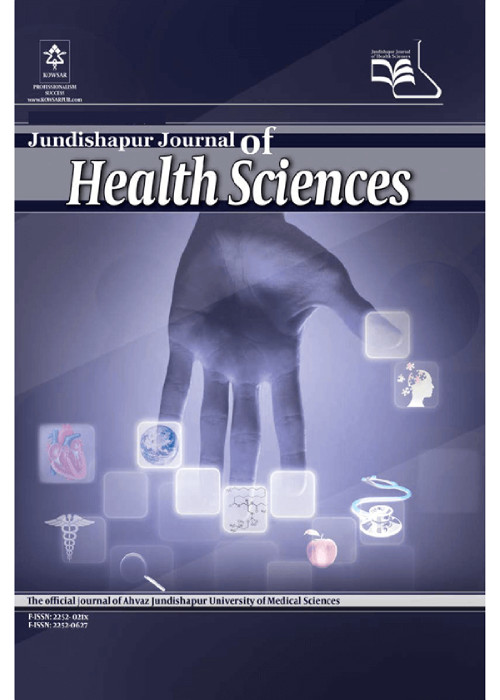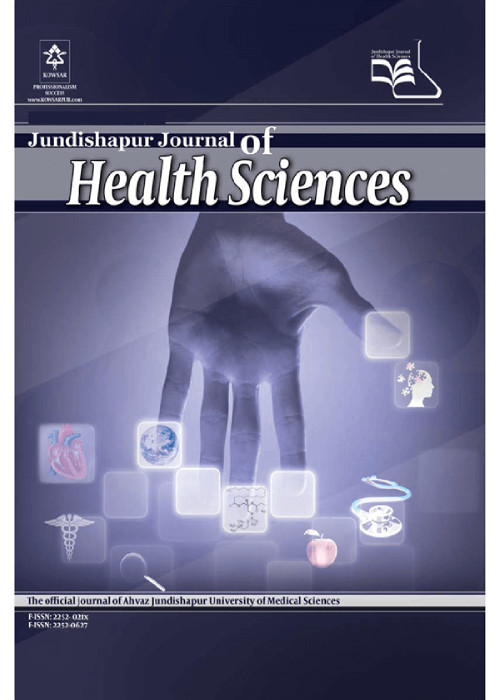فهرست مطالب

Jundishapur Journal of Health Sciences
Volume:15 Issue: 3, Jul 2023
- تاریخ انتشار: 1402/06/22
- تعداد عناوین: 6
-
-
Page 1Background
In recent years, millions of individuals around the world have relied on various methods and information sources to obtain new information; a significant part of the users’ activities is related to the activities of searching for their information needs. An increasing number of individuals use the Internet to have access and search for health information, and the amount of health information provided on the Internet has increased dramatically. As the amount of information increases, the complexity of the information also increases. Whenever complex information is presented, expertise is required to retrieve useful information.
ObjectivesFulfilling information needs is not only limited to printed sources; the existence of wide communication networks has made it possible for users to satisfy their information needs in different ways without time and place restrictions. One of the information needs noticed by different individuals is the need to have access to health and health information. Individuals are looking for information to make an informed decision, and they refer to various information sources. The purpose of this article was to examine the new challenges associated with health information search and then to emphasize the role of librarians in this process.
MethodsA comprehensive search of relevant texts, articles, and studies related to health information seeking and the role of librarians was conducted. The selection criterion was defined as studies that provided insights into the challenges faced in this area.
ResultsScientific sources indicate that access to health information from multiple sources leads to the emergence of challenges, such as information overload, information anxiety, health anxiety, uncertainty, cyberchondria, information avoidance, and self-isolation.
ConclusionsThis study emphasizes that health information seeking is a complex task, primarily due to the abundance of online information and varying levels of digital literacy. Librarians serve as valuable allies in this process, providing expertise, guidance, and access to reliable resources. By recognizing the challenges and leveraging the librarian’s role, efforts can be made to ensure that individuals have access to accurate health information, ultimately leading to better health outcomes.
Keywords: Health Information Seeking, Information Overload, Information Anxiety, Health Anxiety, Uncertainty, Cyberchondria, Information Avoidance, Self-Isolation -
Page 2Background
Water is one of the most valuable environmental factors that play a significant role in human life and health. Domestic fresh water is a basic need for human well-being and economic activities.
ObjectivesThe present study investigated the relationship between religiosity and commitment to the tendency to save water among women in Yazd in 2022.
MethodsThis descriptive-analytical research was carried out in 2022. The research population included all housewives and working women who visited health centers in Yazd City. Three hundred fifty people were randomly selected. The data were collected using 3 questionnaires on the tendency to save water, religiosity, and commitment, which had been used in a similar study. The data were analyzed using SPSS24 software using Pearson correlation coefficient tests, descriptive statistics, chi-square, and t-test.
ResultsThe mean age of the studied women was 33.05 ± 3.62. The mean scores of the tendency to save water, religiosity, and commitment were 42.18 ± 5.14, 41.67 ± 6.35, and 35.11 ± 6.84, respectively. There was a significant relationship between the tendency to save water score and economic status. The correlation matrix showed a significant positive correlation between the tendency to save water, religiosity, and commitment.
ConclusionsCultural factors such as religiosity and commitment or sense of responsibility, as two different elements that form people's attitudes, affect water consumption behavior. These results are much more important for married women in Yazd City because they have an educational role and are influenced by both religious and citizenship cultures.
Keywords: Tendency to Save Water, Religiosity, Commitment, Housewives -
Page 3Background
The present study aims at visualizing and analyzing the scientific productions of data mining in medical sciences in the Web of Science (WoS) database to identify knowledge structure in this field.
MethodsThe present study was carried out using co-word analysis, which is a scientometrics method. Also, the analysis of the WoS approach was used for the visualization and analysis of word co-occurrence networks in the data mining domain. The research population consisted of 14,430 records related to data mining published in WoS from 2008 to 2016. The data were analyzed after retrieval using VoSviewer scientometric software.
ResultsThe research findings showed that the average annual growth rate of scientific productions in the data mining field had an upward trend and reached its peak in 2016. The findings also showed that the USA was the most productive country, with 8123 degrees, claiming the first rank by 27.4% of the total scientific production, and Iran was in the 13th rank with 678 degrees. Among universities and institutions, the Chinese Academy of Sciences (692 degrees), the University of California (621 degrees), and the National Center for Scientific Research (CNSR) (514 degrees) were ranked first to third globally. Among Iranian institutions and universities, Islamic Azad University (IAU), Tehran University, and Iran University of Technological Sciences were ranked 41st, 94th, and 200th in the world with 140, 105, and 66 degrees, respectively. The results of the current research also showed that the field of data mining was formed based on four vocabulary clusters with 108, 82, 73, and 42 words, respectively.
ConclusionsThe recognition of Iran as a successful country in the field of data mining should encourage researchers from other countries to communicate with Iranian scientists.
Keywords: Scientometrics, Co-word Analysis, Network Analysis, Medical Sciences, Visualizing, Data Mining -
Page 4Background
University students’ spiritual well-being (SWB) is a potentially decisive factor in strengthening positive concepts, such as psychological capital (PsyCap).
ObjectivesThis study investigated the relationship between SWB and PsyCap among nursing students.
MethodsThe present descriptive cross-sectional study was conducted on 383 nursing students of a four-year educational program using a convenience sampling method from July to December 2021 in Iran. The tools applied in this study were the psychological capital (PsyCap) questionnaire and the spiritual well-being scale (SWBS). Pearson’s correlation coefficient and hierarchy of multiple regressions were used to analyze the data.
ResultsThe results of Pearson’s correlation coefficient showed a positive and significant relationship between religious well-being (RWB) and self-efficacy, hope, optimism, and resilience (r ranging from 0.36 to 0.45, P < 0.01). Also, the correlation coefficients between existential well-being (EWB) and self-efficacy, hope, optimism, and resilience (r ranging from 0.41 to 0.61, P < 0.01) were positive and significant. Hierarchical multiple regression revealed that two areas of SWB were explained: 26.6%, 37.7%, 29.6%, and 17.9% of the variance in the students’ self-efficacy, hope, optimism, and resilience, respectively.
ConclusionsSWB is a substantial issue in promoting the students’ PsyCap, and it is possible to improve their PsyCap through spirituality-based interventions.
Keywords: Spiritual Well-Being, Psychological Capital, Nursing Students -
Page 5Background
Breaking bad medical news is one of the most difficult tasks of physicians. In this regard, communication skills play a vital role.
ObjectivesThis study aimed to investigate patients’ preferences and attitudes toward receiving bad medical news in academic hospitals affiliated with Guilan University of Medical Sciences.
MethodsThis cross-sectional descriptive study was conducted on patients over 18 years of age from March 2021 to December 2021. A questionnaire taken from Alrukban’s study regarding patients’ demographic characteristics, preferences, and tendencies while receiving bad news was filled out through a face-to-face interview.
ResultsIn this study, 600 patients were interviewed, 96% of which preferred to know their disease diagnosis, 76.2% preferred to be the first person to receive bad news, and employed individuals with younger ages and higher levels of education significantly preferred to be the recipients of illness news. Furthermore, 40.7% of patients preferred not to be accompanied by anyone when receiving bad news, 82.3% preferred to be broken bad news by the head of the medical team, and 50.8%, particularly female, younger, and employed patients, preferred the physician to start the conversation containing some information about the disease. Also, younger female patients significantly preferred the physician to stay with them and provide additional information after presenting the diagnosis in a completely private space.
ConclusionsMost patients preferred to know about their diagnosis. The impact of socio-demographical variables, including age, gender, level of education, and marital status, should be considered when breaking bad news.
Keywords: Attitude, Bad News, Perception, Patient -
Page 6Background
The employees of the IRINN are among the employees operating in the creative industries. Contrary to their important role, it seems necessary for them to benefit from favorable health conditions in their working environment.
ObjectivesThis study aims to evaluate the health of the work environment at IRINN.
MethodsThis cross-sectional study was conducted from September 2021 to August 2022 at the IRINN. The statistical population of the research consisted of 17 managers and editors from different sections of the news network who were interviewed as experts to identify the health components of the IRINN. After this, the collected information was coded and prioritized using the grounded theory method.
ResultsThree categories of components affecting the health of the working environment of the IRINN were identified in the open coding stage, which were classified into three related sub-categories. The highest frequency sub-category was related to the survey and field investigation, increasing productivity of the employees, and inappropriate building. In the axial coding stage, the components of the coding paradigm were identified and analyzed in six categories. In the selective coding stage, the validity of these relationships among the above-said categories was checked.
ConclusionsBased on the results obtained from the grounded theory method, the conditions of the working environment at the IRINN require fundamental changes from the point of view of the building, management structure, health education programs, and, last but not least, modification of common practices.
Keywords: Workplace Health, Grounded Theory Method, The Islamic Republic of Iran News Network (IRINN), Creative Industries


